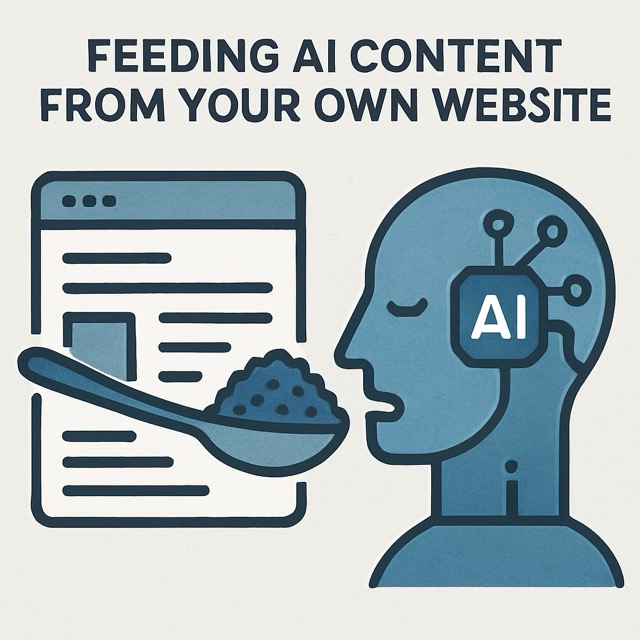How to Get AI to Use Your Website Content? The New Rules of Online Visibility
Have you noticed that more and more people no longer search on Google, but instead ask ChatGPT, Copilot or Gemini? Artificial intelligence has quickly become the go-to source for answers — acting like a modern-day consultant, advisor, and search engine all in one. This is a huge shift in how customers access information — and a major opportunity for businesses that want to stay relevant.
So the real question is: is your business visible to AI? And if not, how quickly can you fix that?
Why does this matter?
Today’s customers are impatient. They want answers immediately, preferably delivered by a digital assistant. AI doesn’t just browse the web — it summarises, recommends, and highlights trustworthy sources.
If your website isn’t “readable” by AI algorithms, you’re not just missing traffic — you’re missing real business opportunities.
Here’s what you stand to gain if your content is chosen by AI:
🔍 More inbound enquiries from potential clients
🧠 A stronger reputation as an industry expert
💬 Presence in modern discovery channels — where your customers are already looking
🥇 A competitive edge over companies that are being overlooked by AI
This is not random: How AI selects content
AI doesn’t pull information out of thin air. Just like Google, it relies on source quality, trustworthiness, and relevance. And you can influence that — once you understand how this new system works.
1. Reputation and credibility of your brand
Let’s start with the basics: is your company seen as a reliable source? AI tends to prioritise content from websites that already have an established presence, are cited by others, and appear trustworthy. That includes:
Are your articles linked to by external sources?
Do you appear in trade publications, news aggregators or niche directories?
Does your website send a clear message: we know what we’re talking about?
Building credibility is a long game — but AI pays attention.
2. Quality and freshness of your content
AI avoids outdated or generic content. Instead, it prefers articles and pages that are:
Fresh, relevant, and updated regularly
Genuinely helpful and answer real customer questions
Written clearly and professionally
FAQs, how-to guides, case studies, bite-sized advice — these are the content formats AI loves. It doesn’t have to be lengthy; it just needs to be useful.
3. The new kid on the block: llms.txt – a guide for AI
A relatively new innovation, but one with big potential. llms.txt is a simple file you place on your website that acts as a guide for AI — telling it which pages and content are most important.
You can use it to:
Highlight key resources on your website
Add short descriptions of what each link offers
Point AI directly to your most valuable content
Think of it as writing a brief memo to ChatGPT: “If you want to represent us accurately, start here.”
Tools like Rank Math SEO can generate this file for you automatically. It’s already making a difference.
4. AI needs clean, accessible websites
Your site should be easy to navigate not only for people — but also for machines. That means:
No technical blocks that prevent content from being crawled
Clear structure (headings, paragraphs, logical flow)
Accessibility for AI “bots” that scan the web for reliable content
If your website is a maze or hiding behind a wall, AI simply won’t see it.
How do the best companies do it?
Forward-thinking businesses already understand the value of being visible to AI. They:
✅ Publish expert-level content regularly
✅ Build online authority through PR, guest posts, and citations
✅ Use smart SEO tools to help AI navigate their content easily
The result? Their advice and articles appear in ChatGPT answers — without spending a penny on ads.
What do you gain by doing this?
More inbound leads — AI will start recommending your company
Increased trust and brand authority — your insights will be recognised
Stronger digital presence — not just in search, but in AI assistants
A real edge over competitors — many of whom haven’t even heard of this yet
Online visibility has evolved: from SEO to AEO (AI Engine Optimisation)
You’ve probably invested in SEO, rankings, maybe even paid ads. But now it’s time to ask:
Are you optimising your business for AI visibility?
Because your customers aren’t just “Googling” anymore.
They’re asking AI. And your business needs to have the answer ready.
What you can do right now (simple checklist)
🔹 Create clear, high-quality content (FAQ, guides, case studies)
🔹 Strengthen your brand’s authority (press mentions, backlinks, expert positioning)
🔹 Use AI-friendly SEO tools like Rank Math
🔹 Implement llms.txt to guide AI to the right pages
🔹 Make sure your site is accessible to AI bots (no technical blocks)
AI is no longer the future — it’s already here
The way customers access information has changed. If your business isn’t showing up in AI-generated responses, you’re being left behind.
But the good news? You don’t need a big budget or a complex strategy to change that.
Just a smart approach, great content, and the right tools.
If AI starts quoting your website — you’ve already won half the marketing battle.
Want help getting started?
Message me — I’ll be happy to walk you through the first steps.

